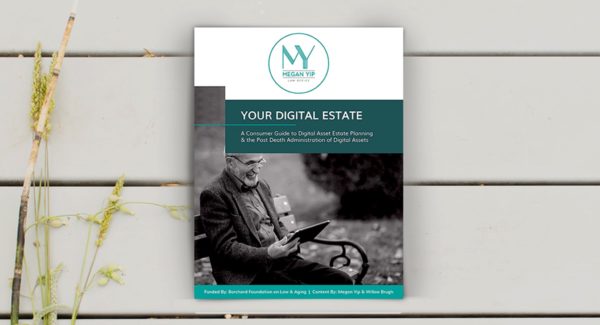Is there a catch to ‘going paperless’?

Many of us get most, if not all, of our bills and correspondence with companies via email. For many reasons this is great. The environment wins, we don’t have to do filing, our kitchen table isn’t full of quite so much mail…the list goes on and on.
However, like most things in life, there’s at least one catch. Some people fear data security. Others feel they have fallen prey to identity theft more often than when they dealt only with paper. I think that these can be valid concerns, but the big problem in my world has to do with what happens after you die. Namely, post-death estate* administration.
In other words –When you kick the bucket, how the heck do we clean up all your stuff, if we don’t know where it is?
One of the first steps that an executor, a trust administrator, a family member or a lawyer has to do when someone dies is taken an accounting of all they have – debts and assets.
In recent history, the surviving family members would watch the mail for a month or so and as the bills and statements rolled in, they’d read them and make note of what accounts the person had. They could also thumb through the paper-filled filing cabinet of the deceased. Today, now that we’ve gone paperless, and often snail-mail-less, all of our account details, records of our debts and many of our assets are in our emails. Most documents and files are kept in online storage. The ability to access your email after death is decided by the Terms of Service of the company who provides your email service and by the Stored Communications Act. Under the Stored Communications Act, which is part of the Electronic Communications Privacy Act, email is given extra protection as stored electronic communication, meaning your family or executor will probably be prevented from accessing it.
If your family, executor, or trust administrator doesn’t have access to your email when you die, they will have a difficult time with the very first task they will be charged with after they bury you – taking an accounting of your assets and debts.
Do you have a plan so it’s easy to clean up your digital accounts after you’re gone?
What about if you have an accident and become unconscious? Will your loved ones be able to pay your bills, communicate with your employer and contact your insurance company while you’re in the hospital? Chances are they won’t find much helpful information written on paper at your house. It’s also likely that they will violate a company’s terms of services if they take the liberty to log into your account. That’s the catch to ‘going paperless’.
*Estate is the legal word to refer to the property of a deceased person. Though it conjures up ideas of a large house on the English Countryside, everyone has an estate – some big, some small, some involving real property, some mostly liquid assets.
Recent Articles
California Advanced Health Care Directive
The questions I’ve been getting most frequently this past week are about Advanced Health Care Directives, so I thought I’d share some basics. Every state has their own law surrounding advanced health care directives or Medical POAs or Living Wills. So you may know...
Your Digital Estate Consumer Guide
I’m excited to share our Free Downloadable Consumer Guide, Your Digital Estate, Frequently Asked Questions: Answered. If you have further questions on the topic, schedule a consultation below.Recent Articles
Thinking about Tech Solutions
I hear from technologists developing software solutions in the digital estate planning space on a regular basis. I commend them as they are all offering their creativity, skills, and resources to a difficult problem with few straight forward solutions. Knowing that...



0 Comments